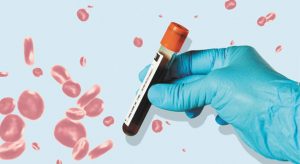By Dr. Viviana Cuberos
 Cancer screenings are pivotal in identifying cancer at its nascent stages, where treatment can be most effective. While several cancers have established screening protocols, many lack efficient screening methods, underscoring the need for innovative approaches to detection.
Cancer screenings are pivotal in identifying cancer at its nascent stages, where treatment can be most effective. While several cancers have established screening protocols, many lack efficient screening methods, underscoring the need for innovative approaches to detection.
Some of the most common cancers that have established screening protocols include breast, cervical, colorectal, and prostate cancer. However, it’s essential to recognize that not all cancers have well-established screening methods, underscoring the significance of exploring innovative approaches to cancer detection.
Despite the availability of screenings for these types of cancer, there are still challenges in detecting certain cancers early enough for effective treatment. Pancreatic cancer, for example, is often diagnosed at an advanced stage due to the lack of specific symptoms and practical screening tests. Similarly, ovarian cancer presents difficulties in early detection, contributing to its high mortality rate. In such cases, developing novel screening methods becomes crucial in improving early detection rates and ultimately saving lives.
The Galleri Blood Test: The Galleri Blood Test represents a promising advancement in cancer screening technology. Analyzing specific biomarkers in blood offers a non-invasive approach to detecting cancer at early stages, when treatment is most effective. Galleri test is the first-of-its-kind multi-cancer early detection test that looks for a signal shared by 50+ types of cancer with a single blood test.1
Facts and Statistics:
1. A study published in Cancer Discovery demonstrated the Galleri Blood Test’s efficacy in detecting multiple cancer types with high sensitivity and specificity (Zhang et al., 2019).
2. The Galleri Blood Test detected pancreatic cancer with 92% sensitivity and 93% specificity in a clinical trial involving over 1,000 participants (National Cancer Institute).
3. According to the World Cancer Research Fund, early cancer detection increases the five-year survival rate by 25% or more.
4. With a single blood test, Galleri screens for a signal shared by multiple cancers that would otherwise go unnoticed. If a cancer signal is detected, Galleri predicts the tissue type or organ associated with the cancer signal with 88% accuracy to help guide follow-up diagnostic testing, which may include lab work or imaging to confirm cancer.
Why Consider the Galleri Blood Test?
1. Early Detection: The Galleri Blood Test enables early detection, which is crucial for improving cancer outcomes and increasing survival rates.
2. Non-Invasive: Unlike invasive procedures like biopsies, the Galleri Blood Test requires only a blood sample, making it convenient and accessible to patients.
3. Comprehensive Screening: With the potential to detect multiple cancer types, the Galleri Blood Test offers a comprehensive approach to cancer screening, particularly beneficial for individuals with a family history of cancer or other risk factors.
4. Galleri looks for a signal associated with active cancer through a blood sample. Every time you take the test, Galleri checks more than 100,000 DNA regions and over a million specific DNA sites to screen for a signal shared by 50+ cancers from your blood draw. If a cancer signal is detected, results from the test can predict the tissue type or organ associated with the cancer signal.
The Galleri blood test represents a promising advancement in cancer screening technology, particularly for cancers lacking effective screening methods. This innovative test analyzes specific biomarkers in the blood that may indicate the presence of cancerous cells or abnormalities in the body. By detecting these biomarkers early, the Galleri blood test offers the potential to identify various types of cancer at a stage when treatment options are most effective. Some of the more prominent cancers Galleri screens for include those that affect the male and female reproductive organs, GI tract, Kidney, Leukemia, Lung, and skin.
Early detection is vital to improving cancer outcomes. By detecting cancer in its early stages, patients have a better chance of receiving curative treatment and achieving long-term survival. The Galleri blood test provides an opportunity for early detection, allowing patients and healthcare providers to intervene at the earliest sign of abnormality.
The Galleri blood test offers a non-invasive and convenient screening option. Unlike traditional screening methods that may require invasive procedures or uncomfortable tests, such as biopsies or colonoscopies, the Galleri blood test requires a blood sample. This minimally invasive approach makes it more accessible and potentially more appealing to patients who may be hesitant to undergo conventional screenings.
The Galleri blood test can detect multiple types of cancer with a single test. This comprehensive approach allows for the early detection of various cancers, providing patients with a more comprehensive assessment of their cancer risk. Additionally, the Galleri blood test may be particularly beneficial for individuals with a family history of cancer or other risk factors, offering them a proactive means of monitoring their health.
It’s important to emphasize that while the Galleri blood test shows promise in cancer screening, it is not a definitive diagnostic tool. If the test results indicate abnormalities or elevated levels of specific biomarkers, further diagnostic evaluation, such as imaging studies or tissue biopsies, may be necessary to confirm a cancer diagnosis. Patients should also consult with their healthcare provider to determine the most appropriate screening options based on their individual risk factors and medical history.
For a complete list of cancer markers identified by the Galleri blood test, please visit:
https://www.galleri.com/what-is-galleri/types-of-cancer-detected
1. www.orchidiamedicalgroup.com/galleri/
CALL TODAY!
239-333-8809
2590 Golden Gate Parkway, Suite 104
Naples FL 34105









